A girl hunts a deer and kills him almost without any emotion. A man attacks her. It's actually her father and trainer. The girl remains on the ground, exhausted, on a white background in the mountains. Next to her the red of the disembowel deer.
The first scene of the new Joe Wright film does nothing but showing us the way he will take throughout the story, with a cinematography made of visual contrasts and an atmosphere of a black fairy tale as a modern take on the works of the Brothers Grimm.
Hanna, in fact, is like the princesses of fairy tales, motherless, saved from the witch and raised far from the world, waiting to be strong enough to take revenge. Many years ago, Hanna's father, a former CIA agent played by Eric Bana, escaped with baby Hanna and her mother - who died - bringing with him a secret that was worth their lives. So he decided to grow his child on the eternal snows of the Arctic Circle, training her to be a perfect killer.
Hanna is rapid, strong, in addiction of English she also speaks German, Italian, Spanish, Japanese, Arabic, but the only knowledge he has of the outside world comes from the words and books from his childhood. She never met anyone, never seen a city, never listened to music. Her only mission is to kill Marissa Viegler before Marissa kills her.
From here begins an adventure that is an action movie and a coming-of-age in which Hanna finds herself step by step until the revelation of her true nature, with a crescendo pace and scenes mysterious and full of tension. Those scenes are good represented, fast but never chaotic, like the one with Hanna running across the ventilation ducts in the CIA building, where the visual impact and the speed of movement blend with the beautiful soundtrack by the Chemical Brothers to the exit in a place you could never image.
Dialogues are concise and the film revolves around the violent chase between the two protagonists which is also a game between the talent of two great actresses, a Saorsie Ronan perfect in her icy beauty and innocence but also pitiless just like the red-haired Cate Blanchett, who's able to frighten even with her eyes or her voice hitting like a knife. In this all-female fight, the character and the performance of Eric Bana result underrated, even the ending disappointed me a little, since I think he (character/actor) deserved a little more.
Hanna's journey toward revenge is marked by all the typical fairy-tale symbolism to the scene of the encounter with the "witch" Marissa, who comes out from the jaws of an enormous wolf in a pure fable final trait.
Hanna review
 Posted : 13 years, 9 months ago on 17 August 2011 08:01
(A review of Hanna)
Posted : 13 years, 9 months ago on 17 August 2011 08:01
(A review of Hanna) 0 comments, Reply to this entry
0 comments, Reply to this entry
The Big Kahuna review
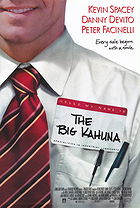 Posted : 13 years, 9 months ago on 8 August 2011 10:25
(A review of The Big Kahuna)
Posted : 13 years, 9 months ago on 8 August 2011 10:25
(A review of The Big Kahuna)A trade show organized in a little hotel in Wichita is the chance to put in one room three men representing three different perspectives on the concept of life. Larry - played by Kevin Spacey - is cynical, pragmatic, foul-mouthed, and seems to thinks only about the profit, both work and life can bring. Phil - played Danny DeVito - is a middle-aged man who thinks he already lived his life and now he's alone, depressed and wondering whether to embark on a new road and a new life or kill himself. Bob - played by Peter Facinelli - is a young Baptist that lives according to religious teachings, apparently innocent and fragile.
With these assumptions, the director John Swanbeck weaves a work that retains its theatrical structure, in fact this film is adapted from a play by Roger Rueff, who also worked on the screenplay. Almost an all-in-one-place where these characters discuss the biggest issues about life: love, infidelity, success, hypocrisy, religion, loneliness, death. With non-stop dialogues these issues are adressed without never trivialize or become melodramatic, using a bit of black humor that is there but it's not ostentatious. This is due not only to a writing both simple and effective, but also thanks to the extraordinary Spacey and DeVito, who give substance and credibility to their characters, so natural to make fiction seem as real as reality. While Peter Facinelli is a little flat in his role of a young man who finds out that the strict parameters of his life are actually a fence and that to preach is to sell, no matter if it's a religion or an industrial lubricant.
In the architecture of the film, the plot is almost non-existent and the character that gives name to the title, that Dick "Kahuna" Fuller, is only an idea of success and a few images from behind, a goal to reach. He's important, but he's not everything. So he's put in the background comparing to their discussions, in an ending credit using the famous essay Wear Sunscreen - written by Mary Schmich and published in the Chicago Tribune as a column in 1997 - in the musical version by Baz Luhrmann with the voice of Lee Perry. An essay that seems summarize the entire clue of this underrated film.
With these assumptions, the director John Swanbeck weaves a work that retains its theatrical structure, in fact this film is adapted from a play by Roger Rueff, who also worked on the screenplay. Almost an all-in-one-place where these characters discuss the biggest issues about life: love, infidelity, success, hypocrisy, religion, loneliness, death. With non-stop dialogues these issues are adressed without never trivialize or become melodramatic, using a bit of black humor that is there but it's not ostentatious. This is due not only to a writing both simple and effective, but also thanks to the extraordinary Spacey and DeVito, who give substance and credibility to their characters, so natural to make fiction seem as real as reality. While Peter Facinelli is a little flat in his role of a young man who finds out that the strict parameters of his life are actually a fence and that to preach is to sell, no matter if it's a religion or an industrial lubricant.
In the architecture of the film, the plot is almost non-existent and the character that gives name to the title, that Dick "Kahuna" Fuller, is only an idea of success and a few images from behind, a goal to reach. He's important, but he's not everything. So he's put in the background comparing to their discussions, in an ending credit using the famous essay Wear Sunscreen - written by Mary Schmich and published in the Chicago Tribune as a column in 1997 - in the musical version by Baz Luhrmann with the voice of Lee Perry. An essay that seems summarize the entire clue of this underrated film.
 0 comments, Reply to this entry
0 comments, Reply to this entry
Another Gantz review
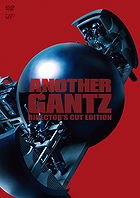 Posted : 13 years, 9 months ago on 8 August 2011 05:31
(A review of Another Gantz)
Posted : 13 years, 9 months ago on 8 August 2011 05:31
(A review of Another Gantz)Another Gantz is a tv movie aired on Nippon Television Network right before the theatrical release of Gantz: The Perfect Answer and it's a kind of a link between the two movies.
After a trailer of the second part film, Another Gantz gives a summary of the first Gantz through the investigation made by a journalist who finds a strange text file on a file sharing site, relating about some people that are supposed to be dead and go on with their lives like nothing happened. It also add some new elements because as the journalist exchanges pictures and documents with the anonymous author of the file, the audience learn more about some characters and their lives after they met Gantz. So you'll see the reaction of the student Nishi Joichiro, a confused Kishimoto Kei tormented by the memories of her supposed suicide, and the familiar circumstances of Suzuki Yoshikazu.
The cast is the same as the first part film, with the exception of the "journalist" Kato Haruhiko. The extensive use in of the previous film scenes makes Another Gantz boring if you watch them at them one after the other. But if it's been a bit of time from Gantz, this tv movie could refresh your memory and prepare you to the following chapter. In addiction, Yamada Takayuki and Ayano Go play two misterious men following the journalist's investigation and apparently searching for "the perfect answer". This add a subplot that increase curiosity while you're waiting for the mistery to be disclosed.
After a trailer of the second part film, Another Gantz gives a summary of the first Gantz through the investigation made by a journalist who finds a strange text file on a file sharing site, relating about some people that are supposed to be dead and go on with their lives like nothing happened. It also add some new elements because as the journalist exchanges pictures and documents with the anonymous author of the file, the audience learn more about some characters and their lives after they met Gantz. So you'll see the reaction of the student Nishi Joichiro, a confused Kishimoto Kei tormented by the memories of her supposed suicide, and the familiar circumstances of Suzuki Yoshikazu.
The cast is the same as the first part film, with the exception of the "journalist" Kato Haruhiko. The extensive use in of the previous film scenes makes Another Gantz boring if you watch them at them one after the other. But if it's been a bit of time from Gantz, this tv movie could refresh your memory and prepare you to the following chapter. In addiction, Yamada Takayuki and Ayano Go play two misterious men following the journalist's investigation and apparently searching for "the perfect answer". This add a subplot that increase curiosity while you're waiting for the mistery to be disclosed.
 0 comments, Reply to this entry
0 comments, Reply to this entry
Source Code review
 Posted : 13 years, 9 months ago on 3 August 2011 09:05
(A review of Source Code)
Posted : 13 years, 9 months ago on 3 August 2011 09:05
(A review of Source Code)I've been looking forward to the Source Code but it's been a big disappointment, there's no other way to say it.
I loved the opening: Jake Gyllenhaal plays Colter Stevens, an Air Force captain that wakes up in a train without knowing how he got there. On the train there's a girl talking like they were friends and calling him "Sean". He tries to explain her he's not Sean but she seems not to understand why he's saying so. Stevens decides to go to the toilet and then looks at the mirror...
I thought it was great, enough to catch my attention. But as the movie went on, the mistery got releaved and I found out what really the Source Code is, I found myself in front of the most absurd theory I ever heard. Every sci-fi story is invented and incredible, it's fiction after all, but basically uses a pseudo-scientific theory that could look plausible. This movie uses the old story of time paradoxes rules, immutable vs. alternate timelines, and puts on them The Source Code, that is something really absurd.
Anyway, I decided to enjoy the human drama side of the movie. In fact, Stevens does his best to rescue the girl and maybe everyone else, even when he finds the truth. And I tried to enjoy the action movie, made of good scenes but with some little flaws, for example I could tell about twenty minutes before the protagonist who the attentator was, and those twenty minutes has been really annoying. Moreover there's no point in leaving your wallet in a train that was going to burn out and make ashes of everything, hoping someone will find it and think you were in there.
It's not I'm too hard to please, but from a big production like this I was asking a little more. Like another ending, not so predictable like that.
I liked Vera Farmiga instead. She's not doing that much in the story, but she's been able to look like a light guiding Stevens from where he is, while Jake Gyllenhaal performance has been good but not great.
I loved the opening: Jake Gyllenhaal plays Colter Stevens, an Air Force captain that wakes up in a train without knowing how he got there. On the train there's a girl talking like they were friends and calling him "Sean". He tries to explain her he's not Sean but she seems not to understand why he's saying so. Stevens decides to go to the toilet and then looks at the mirror...
I thought it was great, enough to catch my attention. But as the movie went on, the mistery got releaved and I found out what really the Source Code is, I found myself in front of the most absurd theory I ever heard. Every sci-fi story is invented and incredible, it's fiction after all, but basically uses a pseudo-scientific theory that could look plausible. This movie uses the old story of time paradoxes rules, immutable vs. alternate timelines, and puts on them The Source Code, that is something really absurd.
Anyway, I decided to enjoy the human drama side of the movie. In fact, Stevens does his best to rescue the girl and maybe everyone else, even when he finds the truth. And I tried to enjoy the action movie, made of good scenes but with some little flaws, for example I could tell about twenty minutes before the protagonist who the attentator was, and those twenty minutes has been really annoying. Moreover there's no point in leaving your wallet in a train that was going to burn out and make ashes of everything, hoping someone will find it and think you were in there.
It's not I'm too hard to please, but from a big production like this I was asking a little more. Like another ending, not so predictable like that.
I liked Vera Farmiga instead. She's not doing that much in the story, but she's been able to look like a light guiding Stevens from where he is, while Jake Gyllenhaal performance has been good but not great.
 0 comments, Reply to this entry
0 comments, Reply to this entry
The Adjustment Bureau review
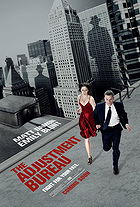 Posted : 13 years, 10 months ago on 15 July 2011 01:41
(A review of The Adjustment Bureau)
Posted : 13 years, 10 months ago on 15 July 2011 01:41
(A review of The Adjustment Bureau)The director George Nolfi had a little treasure in his hands, a short novel by one of the most influential science fiction authors - Philip K. Dick - and the subject that most fascinated the mankind since had looked at the sky: free will. And among all the changes he made to the original story, there was a brilliant one: David, the main character, is destined to become the President of the United States. Nothing else could be more interesting if related with free will, and nothing could have more ways to go through and many aspects to analyze. Nolfi definitely threw all away. What David thinks once he meets the truth is not if he really wants to be the President of a country such as the United States, knowing perfectly he's just a pawn of the real and highest President. He makes a giant fuss to find a girl that kissed him exactly three minutes after they first met. Maybe I'm exaggerated and I knew right from the start this was going to be a love story, but seeing David not caring at all for his future as politician and human being really had sadden me. It could be an extraordinary film about life and also about love, and what remains is a bitter aftertaste you feel for missed chances.
Even their love story is not convincing: not just because I found feeble the chemistry between Matt Damon and Emily Blunt, but just because they were meant to be together in previous plans, so their rebellion seems to be not to the whole system but just the new plan. From this statement a contradiction comes out: if it's the proof that free will doesn't exist and real love, free from destiny, doesn't exist as well, that ending particularly politically correct doesn't make any sense. It seems like the director had the necessity to end the movie quickly and with a lovely happy end, ruining the last part - when David goes through doors and finally escapes with Elise - that is spectacular and uses greatly space and cinematography.
A little final note is about Emily Blunt: it was like she wasn't able to move me, even if her character was interesting for her effect on David's emotions. Those puppy faces she made didn't help at all. And though she was quite good in dancing scenes, especially with other dancers, she hasn't been good in building her character movements in "everyday's life". An example is her way to walk: I didn't see the typical way to walk that every dancer in the world has. This is the first movie of her I've ever seen, and I confess she disappointed me a lot. Especially because people speak highly of her and I expected more from her performance.
Even their love story is not convincing: not just because I found feeble the chemistry between Matt Damon and Emily Blunt, but just because they were meant to be together in previous plans, so their rebellion seems to be not to the whole system but just the new plan. From this statement a contradiction comes out: if it's the proof that free will doesn't exist and real love, free from destiny, doesn't exist as well, that ending particularly politically correct doesn't make any sense. It seems like the director had the necessity to end the movie quickly and with a lovely happy end, ruining the last part - when David goes through doors and finally escapes with Elise - that is spectacular and uses greatly space and cinematography.
A little final note is about Emily Blunt: it was like she wasn't able to move me, even if her character was interesting for her effect on David's emotions. Those puppy faces she made didn't help at all. And though she was quite good in dancing scenes, especially with other dancers, she hasn't been good in building her character movements in "everyday's life". An example is her way to walk: I didn't see the typical way to walk that every dancer in the world has. This is the first movie of her I've ever seen, and I confess she disappointed me a lot. Especially because people speak highly of her and I expected more from her performance.
 0 comments, Reply to this entry
0 comments, Reply to this entry
The Caiman review
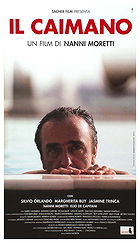 Posted : 13 years, 10 months ago on 13 July 2011 11:03
(A review of The Caiman)
Posted : 13 years, 10 months ago on 13 July 2011 11:03
(A review of The Caiman)Good but just a few of clues for a movie that generally is approximate, touching lightly comedy without making you really laugh and human drama staying on the surface, without even pick the timing: a very long prologue of 17 minutes or so about Bruno - a little film producer on the brink of failing with his job and private life - bored me while I was waiting for the real movie to start. I'd prefer to hear about this through a deeper and more diluited story, that could explain better the reasons of his failure. I think Moretti had a good idea in using a cynical point of view to tell about present Italy, always poised between Bruno, who's compelled to produce a movie about Berlusconi just because it's his only chance to save his company, and the young director, an idealist that want to make a movie about Berlusconi no matter what. Although all this, Moretti wasn't able to involve me and the saving grace is made of beautiful scenes when Bruno "dreams" about the film, a dreamy atmosphere of the fairy tale that some Italians persist in believing.
Buoni ma pochi spunti per un film che nel complesso risulta approssimativo, sfiorando la commedia senza mai far ridere davvero e il dramma personale restando però in superficie, senza nemmeno riuscire ad azzeccare i tempi giusti: un lunghissimo prologo di circa 17 minuti sulla vita di Bruno - un piccolo produttore cinematografico sull'orlo del fallimento professionale e privato - mi ha annoiato mentre aspettavo l'inizio del film vero. Avrei preferito sentire la sua storia attraverso un racconto più profondo e più diluito, che potesse anche spiegare le ragioni di questo fallimento. Buona l'idea di Moretti che adotta un punto di vista cinico per raccontare l'Italia di oggi, sempre in bilico tra Bruno, costretto a produrre un film su Berlusconi solo perché è la sua ultima chance di salvare la sua compagnia, e la giovane regista, idealista che che vuole fare un film su Berlusconi a qualunque costo. Nonostante questo, però, non è riuscito ad appassionarmi e quel che si salva alla fine sono le belle scene in cui Bruno "sogna" il film, quell'atmosfera onirica della favola a cui alcuni italiani si ostinano a credere.
*****
Buoni ma pochi spunti per un film che nel complesso risulta approssimativo, sfiorando la commedia senza mai far ridere davvero e il dramma personale restando però in superficie, senza nemmeno riuscire ad azzeccare i tempi giusti: un lunghissimo prologo di circa 17 minuti sulla vita di Bruno - un piccolo produttore cinematografico sull'orlo del fallimento professionale e privato - mi ha annoiato mentre aspettavo l'inizio del film vero. Avrei preferito sentire la sua storia attraverso un racconto più profondo e più diluito, che potesse anche spiegare le ragioni di questo fallimento. Buona l'idea di Moretti che adotta un punto di vista cinico per raccontare l'Italia di oggi, sempre in bilico tra Bruno, costretto a produrre un film su Berlusconi solo perché è la sua ultima chance di salvare la sua compagnia, e la giovane regista, idealista che che vuole fare un film su Berlusconi a qualunque costo. Nonostante questo, però, non è riuscito ad appassionarmi e quel che si salva alla fine sono le belle scene in cui Bruno "sogna" il film, quell'atmosfera onirica della favola a cui alcuni italiani si ostinano a credere.
 0 comments, Reply to this entry
0 comments, Reply to this entry
The Butterfly Effect review
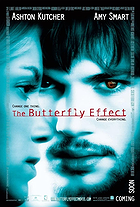 Posted : 13 years, 10 months ago on 13 July 2011 08:14
(A review of The Butterfly Effect)
Posted : 13 years, 10 months ago on 13 July 2011 08:14
(A review of The Butterfly Effect) if there's no notes, what the heck he burns in the final scene?
 0 comments, Reply to this entry
0 comments, Reply to this entry
Rasputin review
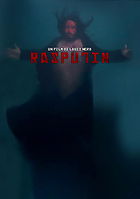 Posted : 13 years, 10 months ago on 13 July 2011 06:50
(A review of Rasputin)
Posted : 13 years, 10 months ago on 13 July 2011 06:50
(A review of Rasputin)The director made an inspired guess: telling about Rasputin through a sort of documentary and "paintings on the move": framed shots that run the screen in various directions. It'd be very fascinating if it was a short film, but creating a feature film where 90% of the audio is voice-over and "normal" scenes are almost absent was - in my opinion - a fatal mistake. The film turns out pedant and I found it hard to get to the end, as hard as it's been for the conspirators to kill Rasputin :)
Il regista ha avuto un'intuizione giusta: raccontare Rasputin attraverso una specie di documentario e dei "quadri in movimento": inquadrature incorniciate che scorrono sullo schermo in varie direzioni. Sarebbe stato affascinante come cortometraggio, ma creare un lungometraggio dove il 90% dell'audio è voce narrante e le scene "normali" sono quasi assenti, è stato - secondo me - un errore fatale. Il film risulta pedante e mi è stato difficile arrivare alla fine, tanto quanto lo è stato per i cospiratori uccidere Rasputin.
*****
Il regista ha avuto un'intuizione giusta: raccontare Rasputin attraverso una specie di documentario e dei "quadri in movimento": inquadrature incorniciate che scorrono sullo schermo in varie direzioni. Sarebbe stato affascinante come cortometraggio, ma creare un lungometraggio dove il 90% dell'audio è voce narrante e le scene "normali" sono quasi assenti, è stato - secondo me - un errore fatale. Il film risulta pedante e mi è stato difficile arrivare alla fine, tanto quanto lo è stato per i cospiratori uccidere Rasputin.
 0 comments, Reply to this entry
0 comments, Reply to this entry
Agnosia review
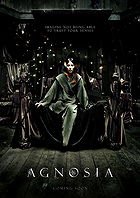 Posted : 13 years, 10 months ago on 9 July 2011 11:59
(A review of Agnosia)
Posted : 13 years, 10 months ago on 9 July 2011 11:59
(A review of Agnosia)Agnosia is a beautiful film. I mean, from an aesthetic point of view is very beautiful. In a retro-futuristic setting, that looks like past but seems to be timeless, you can see a wonderful cinematography made of light and shade effects from which colors come out to be the only guide for the protagonist, Joana. In fact, the day her father is presenting a new astonishing lens for sights, the little Joana faint. When she wake up she can't recognize faces or distinguish objects and places. She grows up and turn into a woman who can't trust her senses. From then, the director plays with his style alternating the chaos in front of Joana eyes with such refined shots to make the movie look like an academic exercise. But what remains is just the idea of an ecercise, and little by little it starts being boring, and all the promises the trailer made - fantasy, eroticism, thriller, spy story - fade away to become a not so original drama with a love triangle and the old story of the man who started with deceiving the girl and end up with falling in love with her. While the subject 'lens' and their real nature are put aside - and leave you a little disappointed and full of questions - the ending comes. Not the most brilliant but the only possible ending.
 0 comments, Reply to this entry
0 comments, Reply to this entry
Norwegian Wood review
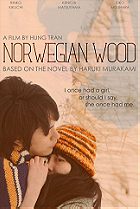 Posted : 13 years, 10 months ago on 4 July 2011 06:43
(A review of Norwegian Wood)
Posted : 13 years, 10 months ago on 4 July 2011 06:43
(A review of Norwegian Wood)There's a mistake the director made. It was to create a movie that is not indipendent from the book. If you've already read "Norwegian Wood", by Haruki Murakami, this film will be a very good occasion to see all those scenes that you found in the novel. And visually it's exactly like the book, every place, every face is just like I imagined while reading. Ken'ichi Matsuyama is a perfect Watanabe: a fine face not really handsome, common features like the common guy he plays. And great was is performance, Watanabe is a "witness of life" but extremely thoughtful. Full of feelings, Matsuyama is able to express them all without overacting. Nice performances by the actresses. Rinko Kikuchi seems to use her tall and strong body to play the tremendously fragile Naoko, highlighting how that frailty is just in her mind. Kiko Mizuhara is a lovely and lively Midori, the girl who represent a solution for Watanabe, teaching him how to live even without realizing she's doing that. Tetsuji Tamayama is handsome and dissolute like you expected from Nagasawa, but there's no much to say about it. And that's too bad, because what I really missed were all the minor characters that give strength and sometimes lighten the story, for example "Storm Trooper", Watanabe's roommate that - in the novel - is the one who make the reader laugh breaking the pression of thoughts and pain and stuff like this. I was disappointed Anh Hung Tran didn't give more space to Storm Trooper, making the whole movie a little too serious. Even Reiko seems to be a secondary character, while she's the key to the ending. In fact, leaving aside her story deprives the last scene of its meaning, looking like a senseless sex scene. Another thing in the ending very disappointing is that Watanabe find out of Naoko death before choosing Midori. In the book it's just the opposite: Watanabe picks Midori - so he picks life - before knowing Naoko killed herself. Inverting this fact has meant that Midori's not the first choice anymore but the only possible choice.
Finally, missing out some important features poses a risk for those who didn't read the novel to consider this movie a sucession of events that, at the end, don't go anywhere.
Finally, missing out some important features poses a risk for those who didn't read the novel to consider this movie a sucession of events that, at the end, don't go anywhere.
 0 comments, Reply to this entry
0 comments, Reply to this entry
 Login
Login
 Home
Home 159 Lists
159 Lists 61 Reviews
61 Reviews Collections
Collections